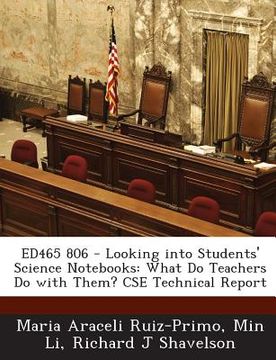Compartir
Ed465 806 - Looking Into Students' Science Notebooks: What Do Teachers Do with Them? CSE Technical Report (en Inglés)
Maria Araceli Ruiz-Primo
(Autor)
·
Min M. D. Li
(Autor)
·
Richard J. Shavelson
(Autor)
·
Bibliogov
· Tapa Blanda
Ed465 806 - Looking Into Students' Science Notebooks: What Do Teachers Do with Them? CSE Technical Report (en Inglés) - Ruiz-Primo, Maria Araceli ; Li, Min M. D. ; Shavelson, Richard J.
19,91 €
20,96 €
Ahorras: 1,05 €
Elige la lista en la que quieres agregar tu producto o crea una nueva lista
✓ Producto agregado correctamente a la lista de deseos.
Ir a Mis Listas
Origen: Estados Unidos
(Costos de importación incluídos en el precio)
Se enviará desde nuestra bodega entre el
Lunes 15 de Julio y el
Lunes 29 de Julio.
Lo recibirás en cualquier lugar de España entre 1 y 5 días hábiles luego del envío.
Reseña del libro "Ed465 806 - Looking Into Students' Science Notebooks: What Do Teachers Do with Them? CSE Technical Report (en Inglés)"
This paper proposes the use of students science notebooks as one possible unobtrusive method for examining some aspects of teaching quality. Students science notebooks were used to examine the nature of instructional activities in their science classrooms, the nature of teachers' feedback, and how these two aspects of teaching were correlated with student achievement. Researchers examined the characteristics of science notebooks for 6 students from each of 10 fifth-grade classrooms. Each entry was analyzed. Results indicate that raters can consistently classify students notebooks in spite of the diversity of the forms of communication (written, schematic, or pictorial). They can also consistently score the quality of a students communication, conceptual, and procedural understanding and the quality of a teachers' feedback to the student. The intellectual demands of the tasks required by the teachers were, in general, low. Teachers tended to ask students to record the results of an experiment or to copy definitions. Low student performance scores across two curriculum units revealed that students communication skills and understanding were far from the maximum score and did not improve over the course of instruction during the school year. Teacher provided little, if any, feedback. Only 4 of the 10 teachers provided any feedback to students notebook entries, and when feedback was provide, comments took the form of a grade, checkmark, or a code phrase. It is concluded that the benefits of science notebooks as a learning tool for students and a source of information for teachers were not exploited in the science classrooms studied. An appendix describes the performance assessments these students used. (Contains 4 figures, 7 tables, and 25 references.) (Author/SLD).

